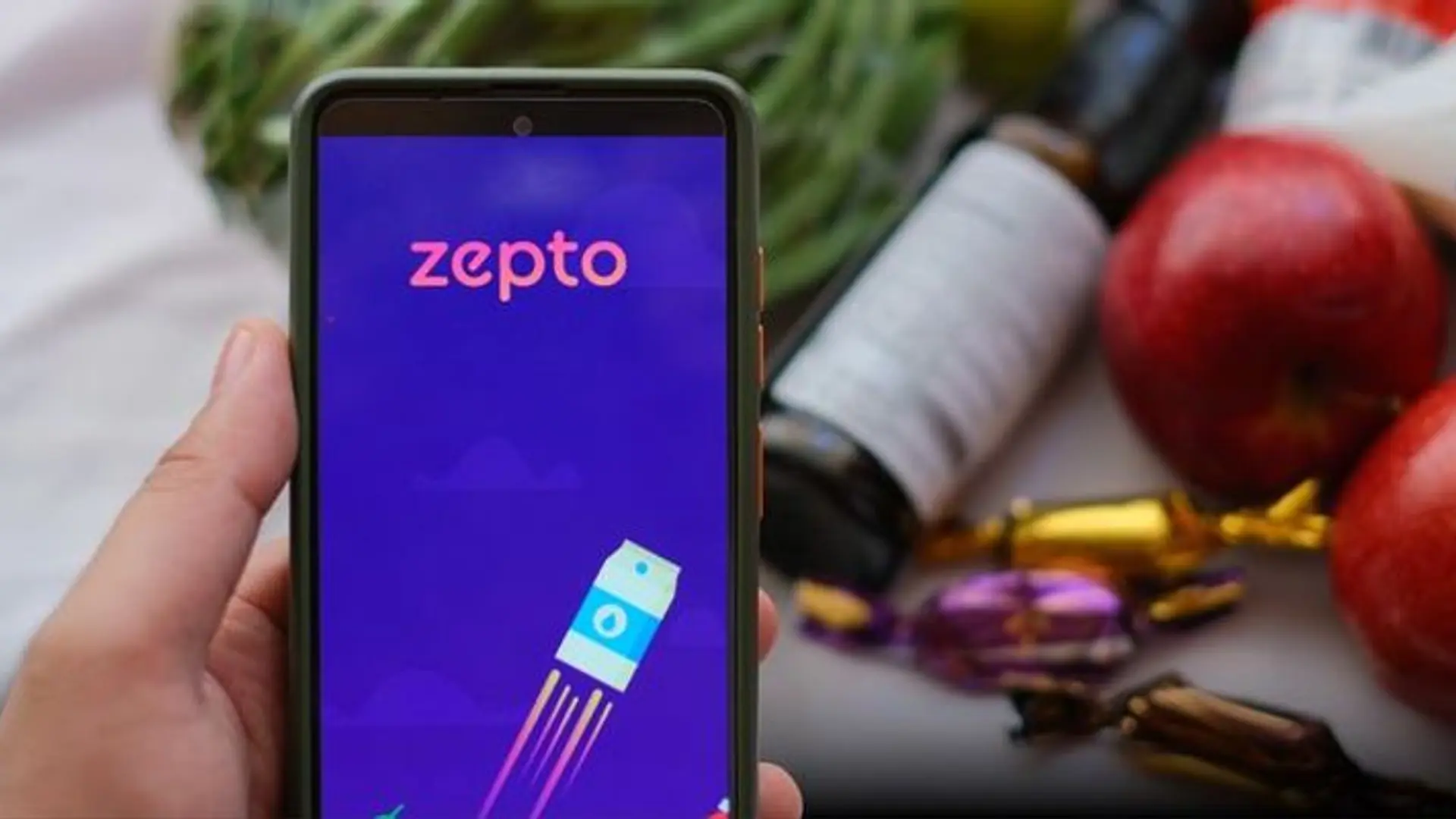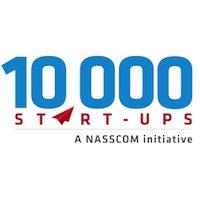
Nasscom 10 000 Start-ups
View Brand PublisherThe Facebook & NASCCOM 10,000 Startups ‘Code for the Next Billion’ programme ends with the ten finalist startups getting revenues, traction, and visibility
With over 400 social tech startups, and NASSCOM predicting this number to grow at an annual rate of 20 percent, the time has never been better to empower Indian startups, and NASSCOM 10,000 Startups and Facebook are leading the charge. Speaking about the programme, Satyajeet Singh, Head of Platform Partnerships, India and South Asia, Facebook said that "one of the reasons we are so passionate about this programme is that we are bringing solutions to touch all lives. These startups are trying to solve the harder problems and bringing technology to the people who need it the most.”
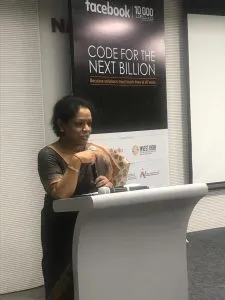
The Code for the Next Billion (CFNB) programme is a joint initiative by Facebook and NASSCOM 10,000 Startups, and was launched in 2015 to empower social impact startups working to create digital innovations for the betterment of society. The programme is also supported by funding partners Unitus Seed Fund, Ankur Capital and Indian Angel Network, outreach partner Invest India, incubation partner Social Alpha and design mentorship partner Design4India.
Speaking at the closing of the second edition of the “Code for the Next Billion (CFNB)” programme in Noida on November 20, Sangeeta Gupta, Sr. Vice President and Chief Strategy Officer, NASSCOM 10,000 Startups, said that “The market opportunity that exists is phenomenal. The ecosystem which has come together as part of CFNB can really help these startups get to the next level.” She also said that the startup ecosystem in India should start looking at what social tech startups are creating.
“CFNB is a very exciting initiative for NASSCOM 10,000 Startups to see one enables social impact startups that are leveraging technology to help scale and grow forward. This is just the second batch of our startups and we are very impressed about how the quality of applications has improved,” said Gupta.
Enabling change for the masses
After the success of the first edition of Code for the Next Billion, the second edition of the programme was launched in October 2017, and received over 250 applications. Following a rigorous screening and selection process, 10 startups made the final cut. The finalists represented diverse sectors including healthcare, education, agritech, and Blockchain.
The finalists were
- Haqdarshak, a social enterprise working to make welfare schemes more accessible to citizens;
- Eye-D, an AI assistant for the visually impaired that helps users be aware of their location, visit places of interest, and ‘read’ printed text;
- Bodhi Health Education, a startup that helps healthcare and dental care organisations hire the right candidates;
- TheTeacherApp, a not-for-profit venture that aims to plug holes in the training infrastructure for educators in the country;
- Jiovio, which provides personalised and predictive maternal care using AI, IoT and wearable technology;
- KrishiHub, improves famers’ lives by providing them with a platform that enables them to sell directly to businesses;
- PublicVibe, a hyperlocal news aggregator in vernacular languages;
- Right2Vote, a voting platform for multiple institutions;
- ChainFrame, focuses on using blockchain to create radically transparent systems for large-scale public use by state and national governments;
- Helper4U Services LLP, aims to do away with middlemen for getting a job for unskilled or semi-skilled helpers.
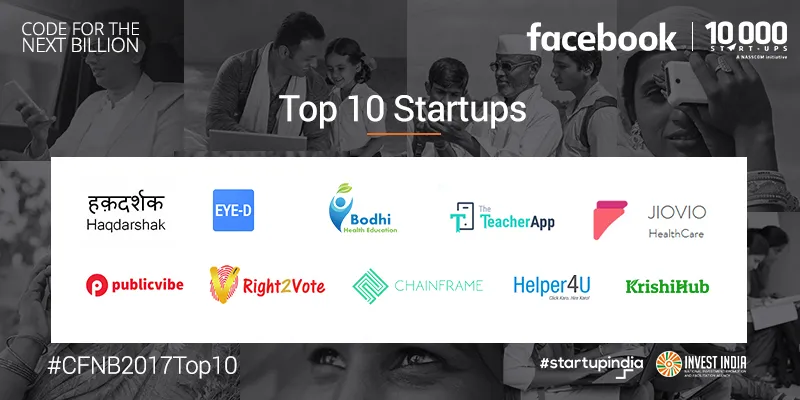
These startups are not just catering to digital natives, but working to transform the lives of new-to-the-internet and bottom of the pyramid users. As per NASSCOM's internet report, the number of internet users in India will see a two-fold rise to 730 million by 2020 and are expected to take an incredible leap towards internet accessibility. This opens up immense possibilities for bringing a world of benefits to them.
Learning and growth
Over the course of six months, the 10 finalists were put through their paces with extensive mentorship and networking sessions where they met possible investors, policymakers and corporates.
Gupta said that the participants really benefitted from the programme, and gained considerable traction. “The startups were able to refine their product to fit the market, and understand how marketing is done,” she added.
Singh said that over the course of the programme, it was enthralling to see the kind of use cases these startups were trying to create by building products by leveraging emerging technologies to solve for social issues. “For instance, using Blockchain for financial inclusion, using AI to help visually impaired people, AI to create virtual doctors and so on,” he elaborated.
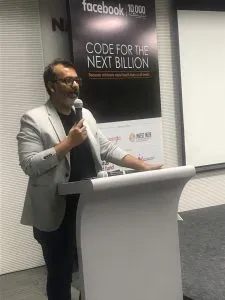
Elaborating further, Singh said that the startups got help where the needed the most, for instance, some needed help with products, some with business.
Speaking about the journey of the startups in the second batch of CFNB, Singh said that it was encouraging to see the kind of impact these startups have seen in such a short period of time. “It was heartening to see that within a short period of time, we could create significant impact in these startups working in different areas,” he added.
In the six-month intensive programme, the entrepreneurial ventures got time-to-time design reviews, business model guidance, meetups, technology support, one-on-one sessions with mentors, sessions on entrepreneurship, investors’ connect and so on. Some of the key mentors included Savy Aluvathingal, Head of Experience Design at Moonraft; Naveen Mamgain, Usability Architect at Railyatri; Shama Rasal, UX Mentor at Springboard; Nitin Kumar, User Experience Design Expert at SAP; Sahil Karkhanis, Senior Director of Product Design at Cleartrip; Kranti M, Director of Strategic Consulting at UX Design Labs; Sameer Chavan, Co-Founder at Particle; Nagesh Susarla, Senior Manager of User Experience at Cisco; Riyaj Shaikh, Faculty member at Srishti Institute of Art, Design and Technology; and Amber Krishan, VP of User Experience at PayU India.
Speaking at the occasion, Amber Krishan, said this was a fantastic initiative by Facebook & NASSCOM 10,000 Startups. "It is not very often where you see industry experts give their varied expertise to startups in India,” he said. He added that the backing of Facebook was an advantage, “both from a brand point of view and from a budget point of view”. Krishan feels that the programme will need to continue and offer strong mentorship to startups. The mentoring sessions mainly focused on guiding the participants with their design ideas and helping them plan better.
As part of the grand finale, the ten finalists participated in a Demo day, where they showcased their products, and charted their growth during the six months, with a roadmap for the way forward.
The finalists’ growth
Facebook’s Satyajeet Singh said that by the end of the programme, these startups had shown significant impact and growth. “The startups who had zero revenue at the start of the programme, are now generating revenues. Some startups have expanded cities and some even countries. Some of these companies have also received accreditation from a lot of governments and the companies,” he said.
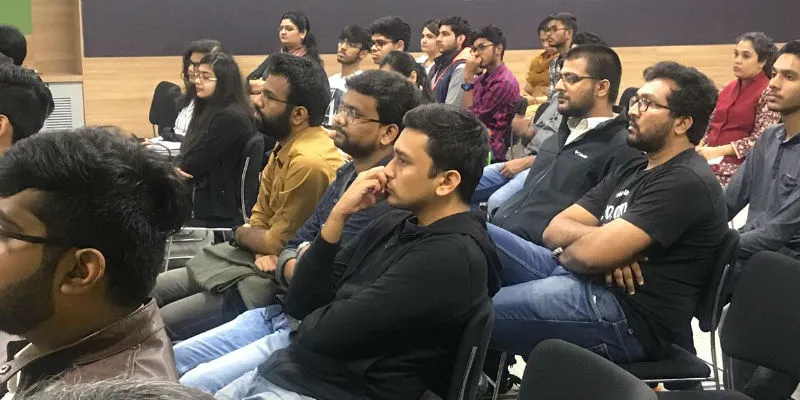
While some grew in terms of revenues, some refined their products, and some worked on the business model. ChainFrame’s founder and CEO Nitin Shukla said that the six-month programme helped his startup to gain traction. “Before the CFNB programme, our visibility was negligible, but over the last six months we have been able to get new leads, and started making revenues, and make our product more functional and simple,” he said. Besides this, he said that they had no projects when they started, but now have five projects.
Similarly, Helper4U, is now looking at international expansion with The Philippines. The voting platform, Right2Vote is now cash flow positive since last month.
JioVio, which focuses on maternal healthcare in rural areas, has expanded its reach significantly in the last six months. “Before the programme, our reach was limited, but now we work with 4,000 pregnant women across south India. We also got various awards and recognition in India as well as globally, and now we are partnering with Bill & Melinda Gates Foundation to reach out to African countries,” said Senthil Kumar Murugesan, co-founder of JioVio.
During CFNB, the startups did not only get the mentorship and sessions, but they also had access to extensive industry network of mentors, and experts at Facebook and NASSCOM. For instance, Facebook helped Eye-D connect with the government to get paperwork done for global expansion. PublicVibe, the hyperlocal news aggregator is now in talks with investors to raise bridge funding of $ 300,000. Krishihub, which helps farmers directly sell produce to companies, had only 500 farmers on its platform before the programme; now, it has more than 10,000 farmers across India. Eye-D, an assistant for visually impaired that helps users be aware of their location, visit places of interest, and ‘read’ printed text. Apart from getting projects in India, Eye-D has also bagged a project in Barcelona.
Gaurav Mittal co-founder of the Eye-D, the AI-enable glasses for visually impaired, said that CFNB did not only helped in startups to improve products and gain tractions, but also helped the companies to understand various aspects of entrepreneurship. “What we ended up gaining was very different and the programmme touched most of the aspects of a startup,” he said. Mittal added that the sessions during the programme, like a session of fund raising touched aspects like ‘why not to raise fund’.
Empowering the next generation of social impact startups
The final day closed with a panel discussion, ‘Empowering the next generation of social impact startups’, chaired by Satyajeet Singh, Amber Krishnan and Sangeeta Gupta. Speaking about how social startups should start in India, Gupta said that, it is very important for the startups in this sector to identify the right platform and connect with domain-specific people as their first step.
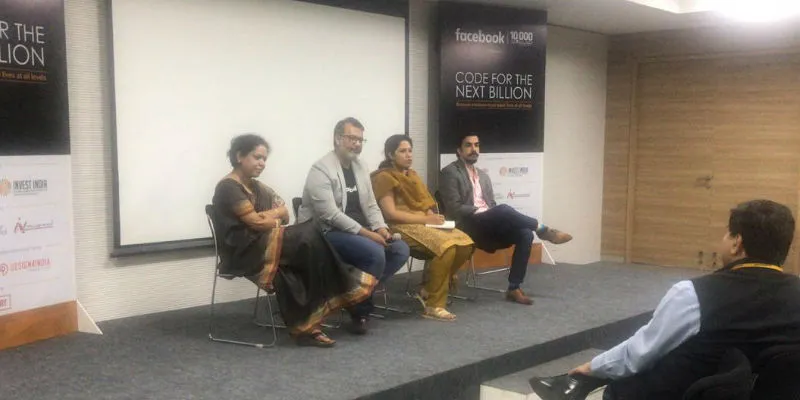
Coming to growth stage, Krishnan said that social startups are no different from any other startups. “All startups tend to face similar kind of challenges, but the philosophy with which you approach the business is important,” he said. He advised CFNB’s second batch to now start looking at profitability, scalability, value proposition, and to get mentorship separately for each of these.
Speaking about scaling, Satyajeet asserted that, "scaling is a choice", and it’s up to the company about how it defines as scale. “If you have global ambitions, the world is your playground, but it is totally okay if you don’t want to, it is okay if you want to solve a particular problem in a particular village, as your fundamentals are right, and you are solving the right problem and have a sustainable business,” he added.
The day wound up with networking sessions after the panel discussions, where startups interacted with each other and with the mentors for the journey ahead. Going forward, these startups will have the opportunity to be a part of Facebook's global startup programme FbStart; a chance to be part of NASSCOM 10,000 Startups Virtual/Warehouse Program; and access to top social impact investors in India.



